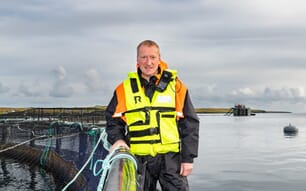MSC certification will bring global recognition of this artisanal fishery’s efforts in sustainable fishing practices in collaboration with WWF India and regional and local partners.
Securing Ashtamudi's commercial clam fishery
The growth of Ashtamudi’s commercial fishery in Kerala was driven by demand from Viet Nam, Thailand and Malaysia in the 1980s and 1990s. By 1991, the catch peaked at 10,000 tonnes a year, but declined 50 per cent in 1993 due to overfishing.
In order to allow stocks to recover, a closed season and mesh size restrictions for nets were introduced, along with a minimum export size and a prohibition on mechanical clam fishing. These measures showed immediate effects, and the clam fishery has sustained landings of around 10,000 tonnes a year for the past decade.
Sustainability measures now taken by the fishery to achieve MSC certification will secure this resource for generations to come. Up to 1,000 fishers in the area rely on the clams for their livelihoods. Fishers paddle dug-out canoes from nearby villages to the shellfish beds. Divers dislodge the clams from the seabed with their hands and feet or a team of two or three fishermen will use a hand-dredge from the canoe.
On a good day, a fisherman can gather as much as 200kg over a period of four to five hours. Another 3,000-4,000 people are involved in cleaning, processing and trading the clams. The value of the clam fishery in the Ashtamudi estuary has recently been estimated at 13.5 million rupees ($220,000).
Leading the way in the developing world
Ashtamudi not only leads the way for other fisheries in India, but across the developing world, as it is only the third fishery in Asia to achieve MSC certification. Worldwide, seafood is one of the most traded food commodities and has a greater economic importance in the developing world than other agricultural commodities. In 2012, net-export revenues reached $35.3 billion, higher than revenues for exports of coffee, tea, bananas, cocoa, rice and rubber. (State of the World Fisheries and Aquaculture 2014).
Fishers for short-necked clams from Ashtamudi will now be able to use the MSC’s distinctive blue ecolabel. This is a milestone that only two other Asian fisheries have achieved so far and could open up new markets in the US and EU.
David Agnew, MSC’s director of standards, said: “The MSC congratulates the Ashtamudi clam fishers and WWF-India on this achievement. The MSC programme is designed to be accessible to all fisheries that are managed sustainably regardless of their scale, size, type or geographical region. But it is also the world’s most rigorous, science-based standard for sustainable seafood.
“We are extremely pleased to see this small-scale fishery become the first in India to be certified to the MSC’s global standard for sustainable fishing. It will be an important addition to the growing number of developing world fisheries that are demonstrating their sustainability through the MSC’s certification programme.”
WWF, fishers and government working together
Vinod Malayilethu, senior coordinator of the Marine Conservation Programme for WWF – India, said: “The partnership between WWF, the fishers and the government shows visible commitment to good management of fisheries. WWF views MSC certification as an effective tool to achieve long term sustainability in small-scale fisheries whilst protecting the marine environment.”
WWF-India’s marine team based in Kochi have been collaborating closely with the Kerala State Fisheries Department, researchers at the Molluscan Fisheries Division of the Central Marine Fisheries Research Institute (CMFRI) and the fishing community since 2010 when the fishery undertook a pre-assessment for MSC certification and subsequently embarked on an improvement phase to meet requirements for certification.
Certification demonstrates the power of collaboration between partners and the importance of grass-roots activism of fishers to protect the environment and their livelihoods. As part of its preparations for MSC-assessment, Ahstamudi clam fishers formed the Village Clam Fishery Council to help develop management measures and officially represent the fishery at regional and state level.
Potential to unlock new markets
Kerala has the highest annual consumption of seafood in the country, at 22.7 kg/capita. Around around 80 per cent of Ashtamudi’s clams are exported to Asia, but the fishery is now hoping to unlock new markets in the US and Europe.
In Viet Nam, MSC-certification of the Ben Tre clam fishery in 2009 expanded access to new markets and has resulted in price increases of 30 to 50 per cent with lower fishing effort, and a 400 per cent increase in fishers’ incomes.
New tools to increase accessibility
Ashtamudi’s clam fishery joins a growing number of MSC-engaged fisheries in the developing world, which represent seven per cent of fisheries in the programme. The MSC is developing new tools and methodologies to increase the accessibility for fisheries that are data-deficient, such as the Risk-based Framework, which was used in the Ashtamudi fishery.
Leena Nair, chairman of the Marine Products Export Development Authority, said: “I congratulate Ashtamudi fishermen involved in clam fisheries, WWF & CMFRI. MSC certification for Ashtamudi’s clam fisheries is a major milestone. I am sure many other fisheries in India practising sustainable operations will come forward to enter the MSC programme.”



